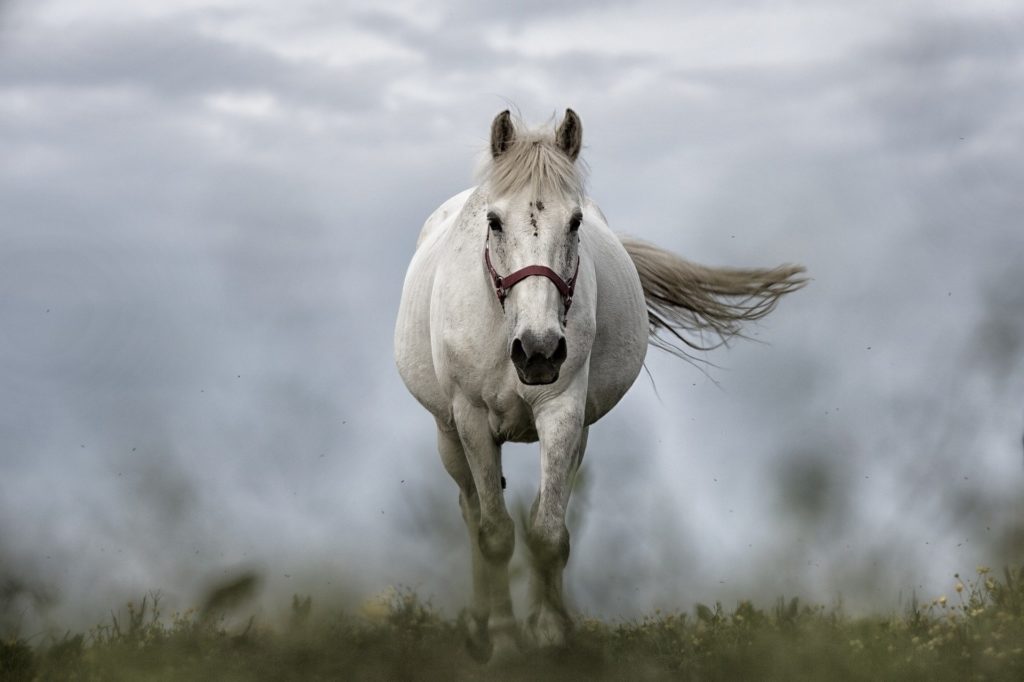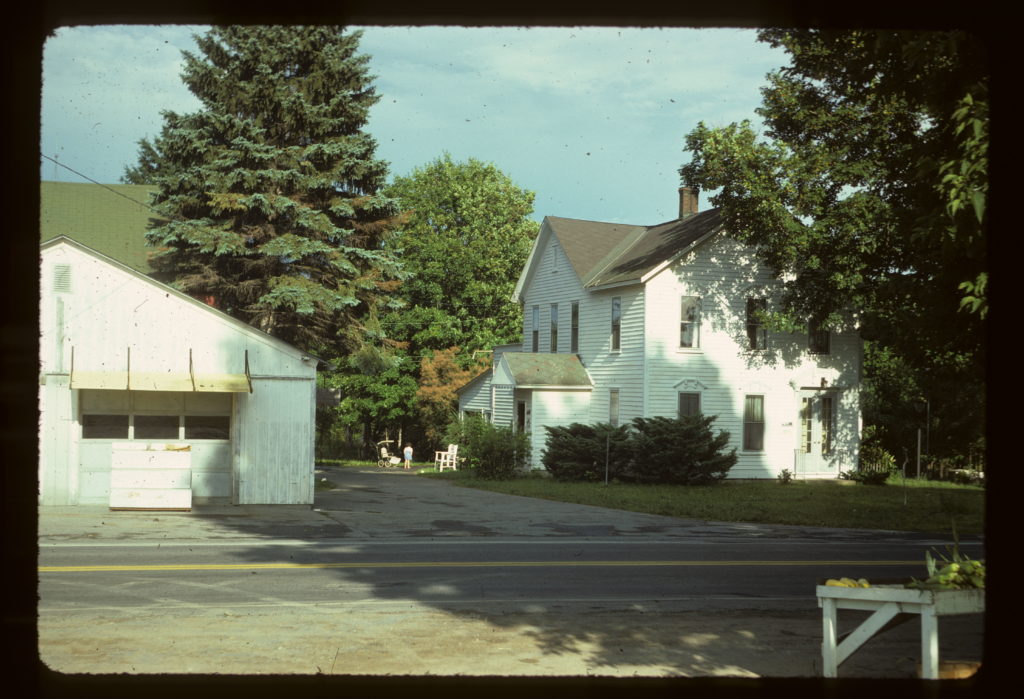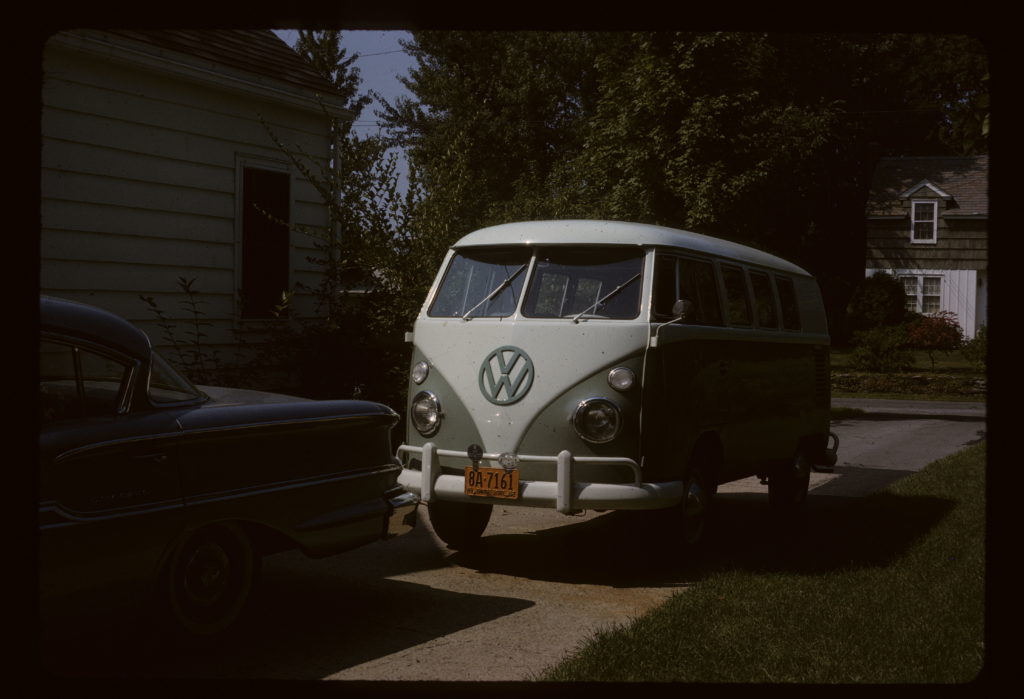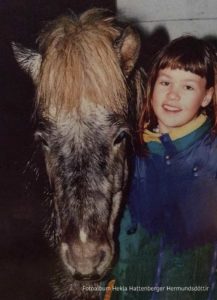
“The children don’t even have a tree to climb”, said their mother, “we must move from the city to the country.”
So, in 1969, we moved from the village of Scotia, NY, across the Mohawk River from Schenectady to an old farm in Ballston Spa. This farm had many apple trees and a small creek that flowed through it. The farmer opposite us, across the street was tending his vegetable stand and carefully observed what we were doing.
Our farm house and the vegetable stand on the right from which Mr. W. observed the activity of the newly arrived city folks.
Our four children loved the land. With our dog they would wander in the forest, climb the apple trees, and go splashing in the shallow creek. The television remained off that whole summer.
On a bright summer day two loose horses ran across the street into the apple orchard behind our house. I asked my friend, the farmer with the vegetable stand,

“Mr. W., do you know who owns these horses and why they might be here?”
“I know to whom they belong”, he replied, “they escaped and no one has been able to catch them.”
“I would like to try catching them,” I said with some confidence. He looked at me and could hardly suppress his urge to laugh.
“You, who grew up in a city, want to catch these horses?” he chuckled, “besides that you are an engineer!”
“Yes, certainly,” I answered him and returned to my family.
“Hey kids,” I said, “hop into our Volkswagen Microbus, we are going to catch some horses.” Our four children were immediately ready for this adventure. The VW rumbled out among the apple trees, but the animals had not gone very far. We stopped within hearing distance from them and I got out of the vehicle. “Pay attention and stay quiet in the car while I try catching the horses.”
The actual VW with which we chased the horses.
Slowly, with outstretched arms and high pitched steady whistling, I approached one of the two horses. It pricked up its ears and stood perfectly still – just as Nonni had described in his books “Sonnentage”, “Auf Skipalon”, and “Ein Ritt durch Island”. The animal luckily still had its reins attached, and I quickly grabbed a hold of them. I had caught the first horse in my life. The other horse, however, ran away. The one I captured quietly followed me to our house where I tied it to a pole and provided it with water. I returned to the VW and drove the kids back to the house.

“Can we keep the horse?”, they begged, “you caught it all by yourself on our own land!”
“No, that is not possible. The animal belongs to some one and we must return it,” I explained.
Now I crossed the street to my farmer friend who had seen all of this and stood there completely baffled.
“Could you please call the owner of this horse and tell him that I captured one of his animals?” Having just moved to this farm, we had no telephone yet, but we had ordered one.
“Yes, I shall do that”, he said, while looking at me as if I were a magician.
“And where do you think the second horse went?”, I asked.
“Most probably it returned to its home because you caught its companion.”
Now I returned home. My friend, Mr. W., was scratching his head, likely thinking “How on earth did accomplish this? He is a city boy and an engineer with book learning only.”
I did not tell him that I learned horse catching from Nonni. In America the Nonni books are completely unknown and most of them are unavailable in English.
A little later the owner picked up his horse.
This is a true story from the year 1969.
Many thanks, Nonni. Happy 160th birthday!
Wendell Neugebauer
Nov. 16, 2017.


One Response
The author Wendell Neugebauer is right saying that Nonni’s books are unknown in the United States of America because most of them have not yet been translated into English. However, there are a few, in fact – see below:
– Lost in the Arctic. Adventures of Two Boys. P. J. Kenedy & Sons, New York 1927. Translation of the original title „Nonni und Manni. Zwei isländische Knaben“. Josef Habbel, Regensburg 1914.
– Nonni & Manni. Lost in the Arctic. P. J. Kenedy & Sons, New York 1958. Translation of „Nonni und Manni. Zwei isländische Knaben“. Josef Habbel, Regensburg 1953.
– Lost in the Fjord. The Adventures of Two Icelandic Boys. Chaos to Order Publishing, San José California 2013. New translation of „Nonni und Manni. Zwei isländische Knaben“. Josef Habbel, Regensburg 1953.
– A Journey Across Iceland. The Ministry of Rev. Jón Sveinsson S.J. Chaos to Order Publishing, San José California 2014. First publication as a book of Jón Sveinsson’s own travellogue in Danish „Reiseerindringer fra Island fra Sommeren 1894“. Museum 4 – the translator’s name is unknown.
– „At Skipalon“ – „Sunny Days“. Two bestsellers in one book. Nonnahús 2002. Translation of the original title „Auf Skipalón“. Herder, Freiburg im Breisgau 1928, and „Sonnentage“. Herder Freiburg im Breisgau 1915.
Enjoy reading them!